“Surge capacity” is a term previously used in hospitals meaning an ability to handle an influx of new patients. It is not selective in who it afflicts: you may be a business owner, team member, stay-at-home mum or a student. After adapting our lives due to the COVID-19 coronavirus for most of 2020 and getting by using an internal supply of adrenaline and hope, Brene Brown says “It’s like the wind (from a hurricane) is breaking the windows and we’re in clean up at the same time”.
I remember a version of that during Tropical Cyclone Evan in Fiji on 14 December 2012 when we tried to stop horizontal rain coming through the windows with bath towels! It didn’t work.
With respect to this year, for me it feels like the end is in sight and what we’re experiencing now has to be normal for today because we’re certainly not going back to exactly how life was before. Ever. And right now we can’t possibly know what the future holds and what a “new normal” might look like so we’re best to assume “normal” is what’s happening now! And try to manage our energy and all other aspects of our lives around that.
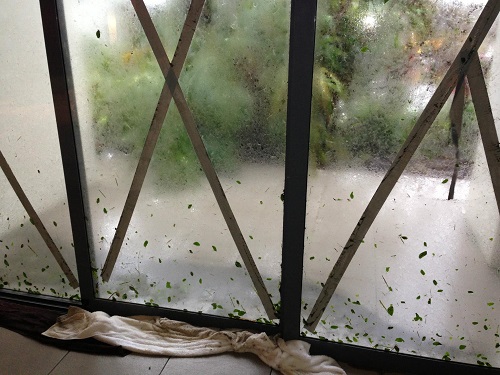
Psychologist and professor of child development at the University of Minnesota Ann Masten PhD says “Surge capacity is a collection of adaptive systems – mental and physical – that humans draw on for short-term survival in acutely stressful situations such as natural disasters. But natural disasters occur over a short period, even if recovery is long. Pandemics are different – the disaster itself stretches out indefinitely…
The pandemic has demonstrated both what we can do with surge capacity and the limits of surge capacity. When it’s depleted, it has to be renewed. But what happens when you struggle to renew it because the emergency has now become chronic?”
COVID-19 is not a cyclone!
Being in a cyclone was one of the most terrifying experiences of my life. We had a couple of days to prepare and we’d seen images of cyclones many times; unlike this pandemic we had a reference point you might say. Whilst it was the worst cyclone to cross Fiji in 20 years, we knew we were staying in a great hotel (Hilton) that had systems in place to give us the best chance of staying safe.
These included:
- Being in a room made of bricks
- Constant updates about the weather
- Taped windows
- Sun lounges were taken to the beach, turned upside down and filled with sand so they didn’t become missiles/blow away
- Food rations
- Torches
- Advice to fill the bath with water (in case pipes burst) and put suitcases on top of the wardrobe (as we were on the ground floor and there may be a tidal surge). This was really hard by the way – have you ever tried to lift a full suitcase on top of a wardrobe? Note to self to remember that when packing next time!
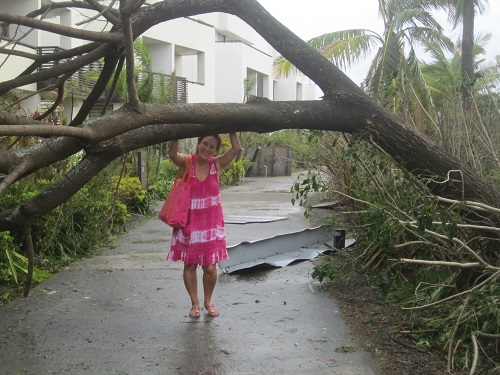
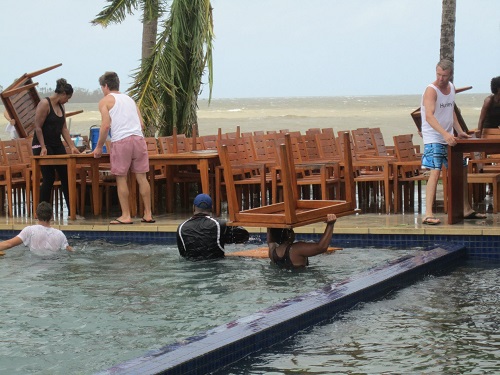
We stayed in our room for 24 hours and then a massive clean-up began. My son and his friends got in the pool and were part of a chain gang where restaurant furniture was passed along and dunked in the pool for its first clean. (He’s the one here with a table on his head!)
You can’t necessarily see “surge capacity”
This pandemic is not like most of that though. Yes we had to physically stay inside with rations – remember at the start when you could only buy one packet of rice or toilet paper and 2 of milk? The main difference is that there’s no certain end in sight. Even now.
Parts of Australia were in lockdown for months and even now that restrictions have been lifted none of us can slot straight back to the life we had previously, especially if we used to travel for business or pleasure and were looking forward to doing that again any time soon.
And unlike the cyclone, where it was “all hands on deck” to make good as early as possible and everyone could see physical damage, in this situation, just like with mental illness, people are suffering and you can’t necessarily see it. And most people aren’t talking about it because even now some people still believe there is stigma attached to not coping so they suffer in silence.
In the work I have been doing for nearly 15 years as a business coach, and speaking for the last few years about the vitality of people and organisations, even before this year I saw mental illness as a battle people are fighting every day in some form. If it is not themselves it is a team member or family member.
What can we do?
Some have described the loss of our “previous life” as ambiguous because the boundaries aren’t exactly clear and we don’t really know what’s going on. Other examples of “ambiguous loss” are grieving infertility or the death of an ex-spouse. The loss may be physical or psychological such as when someone has dementia.
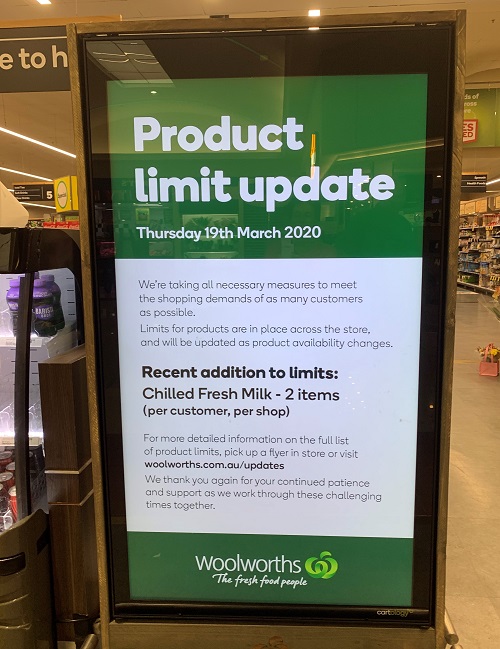
The first step is awareness and taking care of ourselves before we can support others. And looking after ourselves includes having what cardiothoracic surgeon Michael Maddaus calls a “Resilience Bank Account”.
To make “deposits” to this account involves looking after ourselves in 8 areas:
- Sleep
- Nutrition
- Exercise
- Meditation
- Self compassion
- Gratitude
- Connection with others
- Saying “no”/doing nothing
Additionally he talks about the benefits of having projects to work on when the outcome is independent of what else is going on in the world. Our bodies and minds enjoy project planning and outcomes. We might not see the value in making a detailed plan today for an overseas holiday but we could plan and then action sorting out family photos or, in his case “changing every shower head and light bulb in the house”. There is planning and vicarious satisfaction from doing the job that is nothing to do with what else is going on in the world…assuming shower heads are bulbs are available!
Outcomeless activities
As part of the vitality goal I encourage people to live business and life through a lens of PEPP® which means Purpose + Energy + Pleasure + Profit.
To this end to maintain my own vitality, I often engage in what I call “outcomeless activities”. Yes, there are absolutely times when we need to work with a plan and purpose and have a profit goal but, I also absolutely believe that there are times when, to keep our energy in check, we need to deliberately do some activities without an end in mind, often for the sheer pleasure of it.
Some ideas are:
- Being at the beach or some other natural place and it doesn’t matter if you walk, swim, sleep or read
- Looking at the clouds and imagining ‘things’ from the shapes they make, especially if there’s a breeze and they morph from one thing to another in front of your eyes
- Listening to music.
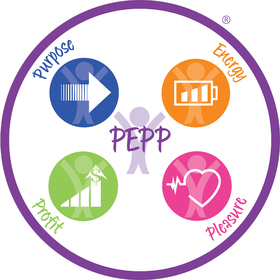
In my world there is definitely an overlap between keeping your PEPP® up and the Resilience Bank Account.
Is there anything I may help you with?
After the year we’ve all had reaching out for vitality support for yourself or your team or your business to help combat surge capacity would be completely understandable and encouraged. In fact most of the people I start working with are looking for improvement in something: sometimes in the beginning they’re not sure exactly what they’re looking for but they just know things could be better!
Early in 2021 I’ll be offering a variety of options – online and in person, half day and longer workshops – to help people PEPP® up and “kick start” the year with some different perspectives.
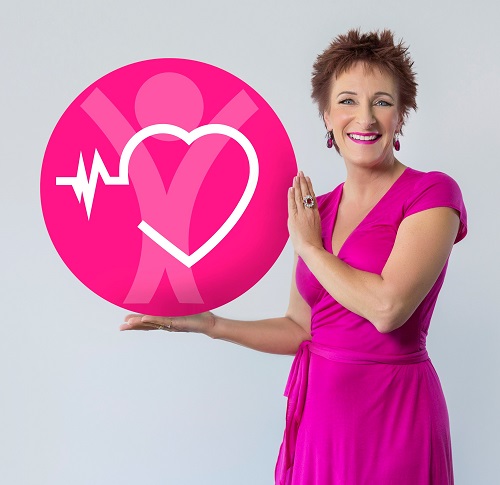
The first event is a FREE 50 minute webcast on Thursday 21st January 2021 at 11 am AEST called Why VITALITY Is Important Now & How To Improve YOURS Book here now!!!
I work with leaders and business owners, as individuals or as part of a group, as well as their teams. If you’d like to know more, please reach out via the Contact page.
Please remember to continually make deposits to the Resilience Bank Account and regularly do some “outcomeless activities”. I’d love to know your favourite… please share!

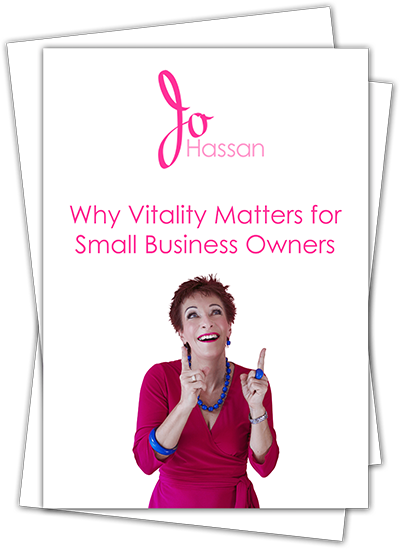
Leave A Comment